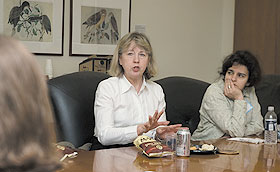  |
| HOME | THIS ISSUE | CALENDAR | GRANTS | BACK ISSUES | < BACK | NEXT > |
Female faculty in math, science find support in group by Cindy Weiss - April 28, 2008 | ||||
| Its acronym may sound frivolous – WIMSE – but whimsy is not the word to describe the work of Women in Math, Science, and Engineering. This ad hoc group of female faculty members focuses on issues such as hiring and retaining women in technical disciplines, achieving equity in resources and treatment, and “making sure these issues stay in the forefront of people’s attention,” says Amy Howell, professor of chemistry. Howell and Maria Rubio, associate professor of physiology and neurobiology, have shepherded the group for the past five years or so, but its membership is not limited to women in the College of Liberal Arts and Sciences. A fluctuating group of up to 25 female faculty from CLAS, pharmacy, engineering, and agriculture get together on the Storrs campus two or three times a semester for a WIMSE lunch. WIMSE’s larger mailing list of 130 keeps the lines of communications open among women at the Storrs and regional campuses and the Health Center who are in the STEM disciplines – science, technology, engineering, and math. “These are disciplines where women remain underrepresented,” notes Howell. The dearth of women in the sciences is a national problem that is getting attention. The American Chemical Society’s magazine, Chemical & Engineering News, recently reported on the U.S. House of Representatives diversity caucus’s public meeting to map an agenda for getting more women and minorities into the sciences. One panelist at the meeting was quoted as saying that faculty diversity has not progressed very far, despite an increase in the number of Ph.D.s that academia produces. WIMSE was formed in part to address the needs of women who are already at UConn, to lend support and keep women from feeling isolated in their disciplines. The group grew out of a National Sciences Foundation grant proposal six years ago to find ways to improve the campus environment for women in STEM disciplines. UConn did not receive the grant, but CLAS dean Ross MacKinnon provided support to get WIMSE started. “I had never thought there could be a group like this,” says Rubio, who earned her Ph.D. and MD at the University of Alicante in Spain and worked at the National Institutes of Health and the Max Planck Institute of Experimental Medicine in Goettingen, Germany, before joining UConn. When she arrived at the University, her department was located in an annex on the back side of Horsebarn Hill, far from other departments and other female scientists. It has since moved to the Pharmacy/Biology and Torrey Life Sciences buildings. WIMSE provided “a way to meet more of the University,” she says.
In WIMSE, women can meet colleagues at all stages of their career and find support and research collaborators. “We want to be a resource for people trying to navigate their way through tenure,” says Howell. Last year, WIMSE sponsored an all-day career forum for female faculty, postdoctoral researchers, and graduate students in STEM disciplines. More than 80 attended. It was clear there’s a need for training in successful career development and in how to negotiate, Howell says, as well as for interaction among people with common interests. Although the number of female graduate students in the sciences appears to be increasing, members of the group say, many of those seeking higher degrees plan to work in corporate labs or non-academic settings. Howell says yung women have a hard time seeing how they could juggle the demands of family life with the demands of getting tenure. Rubio says she sees more female graduate students than male switch from a Ph.D. program to a master’s. Through WIMSE, women in science bring these issues to the attention of University administrators. “You get the sense people recognize that this cohort of 130 women is an important group,” says Howell, “and that there is still work to be done.” One of the perennial issues that members of the group raise is the need for year-round child care close to campus. Infant care and day care during the summer – prime time for research – are especially important, they say. Another important issue is the need for mentors for graduate students and postdoctoral scholars. WIMSE will probably remain an ad hoc forum rather than a structured organization, says Howell, because its members are already so busy. Even so, its voice is being heard. President Hogan recently met with the women and asked them to identify their priorities. The consensus, says Howell, is that the top priority is the recruitment of women in STEM disciplines. |
| ADVANCE HOME UCONN HOME |

